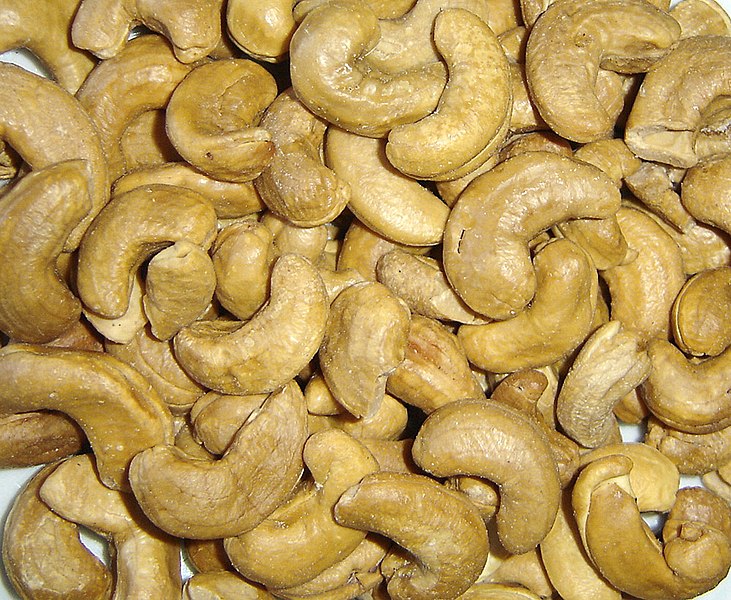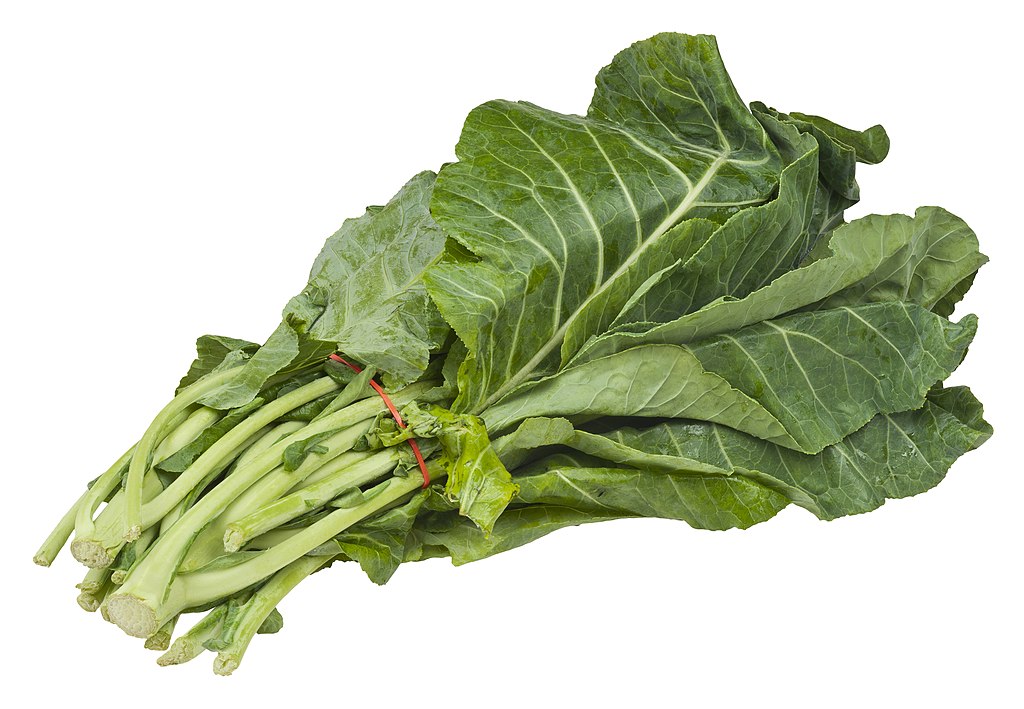Cashews vs. Collard Greens
Nutrition comparison of Cashews and Collard Greens
Ever wonder how your favorite foods stack up against each other in terms of nutrition?
We compared the nutritional contents of
cashews
versus
collard greens
(100g each)
below using 2020 USDA and NIH data[1].
For a quick recap of significant nutrients and differences in cashews and collard greens:
- Both cashews and collard greens are high in dietary fiber and potassium.
- Cashew has more thiamin, pantothenic acid and Vitamin B6, however, collard green contains more riboflavin and folate.
- Cashew is an excellent source of iron and protein.
- Collard green has 11.8 times less sugar than cashew.
- Collard green is an excellent source of Vitamin A, Vitamin C, Vitamin K and calcium.
USDA sources for nutritional information: Cashews (Nuts, cashew nuts, raw) and Collard Greens (Collards, raw) . Have a correction or suggestions? Shoot us an email.
Calories and Carbs
calories
Cashew is high in calories and collard green has 94% less calories than cashew - cashew has 553 calories per 100 grams and collard green has 32 calories.
For macronutrient ratios, cashews is lighter in protein, much lighter in carbs and much heavier in fat compared to collard greens per calorie. Cashews has a macronutrient ratio of 12:21:67 and for collard greens, 31:55:14 for protein, carbohydrates and fat from calories.
Macro Ratios from Calories:
| Cashews | Collard Greens | |
|---|---|---|
| Protein | 12% | 31% |
| Carbohydrates | 21% | 55% |
| Fat | 67% | 14% |
| Alcohol | ~ | ~ |
carbohydrates
Cashew is high in carbohydrates and collard green has 82% less carbohydrates than cashew - cashew has 30.2g of total carbs per 100 grams and collard green has 5.4g of carbohydrates.
dietary fiber
Both cashews and collard greens are high in dietary fiber. Collard green has 21% more dietary fiber than cashew - cashew has 3.3g of dietary fiber per 100 grams and collard green has 4g of dietary fiber.
sugar
Collard green has 11.8 times less sugar than cashew - cashew has 5.9g of sugar per 100 grams and collard green has 0.46g of sugar.
Protein
protein
Cashew is an excellent source of protein and it has 503% more protein than collard green - cashew has 18.2g of protein per 100 grams and collard green has 3g of protein.
Fat
saturated fat
Cashew is high in saturated fat and collard green has 99% less saturated fat than cashew - cashew has 7.8g of saturated fat per 100 grams and collard green has 0.06g of saturated fat.
Vitamins
Vitamin C
Collard green is an excellent source of Vitamin C and it has 69 times more Vitamin C than cashew - cashew has 0.5mg of Vitamin C per 100 grams and collard green has 35.3mg of Vitamin C.
Vitamin A
Collard green is an excellent source of Vitamin A and it has more Vitamin A than cashew - collard green has 251ug of Vitamin A per 100 grams and cashew does not contain significant amounts.
Vitamin E
Cashews and collard greens contain similar amounts of Vitamin E - cashew has 0.9mg of Vitamin E per 100 grams and collard green has 2.3mg of Vitamin E.
Vitamin K
Collard green is an excellent source of Vitamin K and it has 11 times more Vitamin K than cashew - cashew has 34.1ug of Vitamin K per 100 grams and collard green has 437.1ug of Vitamin K.
The B Vitamins
Cashew has more thiamin, pantothenic acid and Vitamin B6, however, collard green contains more riboflavin and folate. Both cashews and collard greens contain significant amounts of niacin.
| Cashews | Collard Greens | |
|---|---|---|
| Thiamin | 0.423 MG | 0.054 MG |
| Riboflavin | 0.058 MG | 0.13 MG |
| Niacin | 1.062 MG | 0.742 MG |
| Pantothenic acid | 0.864 MG | 0.267 MG |
| Vitamin B6 | 0.417 MG | 0.165 MG |
| Folate | 25 UG | 129 UG |
Minerals
calcium
Collard green is an excellent source of calcium and it has 527% more calcium than cashew - cashew has 37mg of calcium per 100 grams and collard green has 232mg of calcium.
iron
Cashew is an excellent source of iron and it has 13 times more iron than collard green - cashew has 6.7mg of iron per 100 grams and collard green has 0.47mg of iron.
potassium
Both cashews and collard greens are high in potassium. Cashew has 210% more potassium than collard green - cashew has 660mg of potassium per 100 grams and collard green has 213mg of potassium.
Antioxidants and Phytonutrients
carotenoids
Carotenoids are micronutrients commonly found in plants and some animal products. An example is beta-carotene, the notable carotenoid which is a popular source of Vitamin A.[4][5]
For specific types of carotenoids,
| Cashews | Collard Greens | |
|---|---|---|
| lutein + zeaxanthin | 22 UG | 4323 UG |
| beta-carotene | ~ | 2991 UG |
| alpha-carotene | ~ | 14 UG |
Omega-3 and Omega-6
omega 3s
For omega-3 fatty acids, both cashews and collard greens contain significant amounts of alpha linoleic acid (ALA).
| Cashews | Collard Greens | |
|---|---|---|
| alpha linoleic acid | 0.062 G | 0.108 G |
| Total | 0.062 G | 0.108 G |
omega 6s
Comparing omega-6 fatty acids, cashew has more linoleic acid than collard green per 100 grams.
| Cashews | Collard Greens | |
|---|---|---|
| other omega 6 | ~ | 0.002 G |
| linoleic acid | 7.782 G | 0.082 G |
| Total | 7.782 G | 0.084 G |
Customize your serving size
The comparison below is by weight, but sometimes 100g isn't that intuitive of a measurement for food. View a custom portion comparison (e.g. cups, oz, package).
You can try adding or subtracting the amount of either Cashews or Collard Greens .
Note: The specific food items compared are: Cashews (Nuts, cashew nuts, raw) and Collard Greens (Collards, raw) .
Cashews g
()
|
Daily Values (%) |
Collard Greens g
()
|
|||||
|---|---|---|---|---|---|---|---|
| KCAL % |
|
5% | calories | 5% |
|
KCAL % | |
| G % |
|
5% | carbohydrates | 5% |
|
G % | |
| G % |
|
5% | dietary fiber | 5% |
|
G % | |
| G | 5% | sugar | 5% | G | |||
| G % |
|
5% | total fat | 5% |
|
G % | |
| G % |
|
5% | saturated fat | 5% |
|
G % | |
| G | 5% | monounsaturated fat | 5% | G | |||
| G | 5% | polyunsaturated fat | 5% | G | |||
| G | 5% | trans fat | 5% | G | |||
| MG | 5% | cholesterol | 5% | MG | |||
| MG % |
|
5% | sodium | 5% |
|
MG % | |
| 5% | Vitamins and Minerals | 5% | |||||
| UG % |
|
5% | Vitamin A | 5% |
|
UG % | |
| MG % |
|
5% | Vitamin C | 5% |
|
MG % | |
| IU % |
|
5% | Vitamin D | 5% |
|
IU % | |
| MG % |
|
5% | calcium | 5% |
|
MG % | |
| MG % |
|
5% | iron | 5% |
|
MG % | |
| MG % |
|
5% | magnesium | 5% |
|
MG % | |
| MG % |
|
5% | potassium | 5% |
|
MG % | |
| MG % |
|
5% | thiamin (Vit B1) | 5% |
|
MG % | |
| MG % |
|
5% | riboflavin (Vit B2) | 5% |
|
MG % | |
| MG % |
|
5% | niacin (Vit B3) | 5% |
|
MG % | |
| MG % |
|
5% | Vitamin B6 | 5% |
|
MG % | |
| MG % |
|
5% | pantothenic acid (Vit B5) | 5% |
|
MG % | |
| UG % |
|
5% | folate (Vit B9) | 5% |
|
UG % | |
| UG % |
|
5% | Vitamin B12 | 5% |
|
UG % | |
| MG % |
|
5% | Vitamin E | 5% |
|
MG % | |
| UG % |
|
5% | Vitamin K | 5% |
|
UG % | |
| G % |
|
5% | protein | 5% |
|
G % | |
| UG % |
|
5% | biotin (Vit B7) | 5% |
|
UG % | |
| MG % |
|
5% | choline | 5% |
|
MG % | |
| MG % |
|
5% | chlorine | 5% |
|
MG % | |
| UG % |
|
5% | chromium | 5% |
|
UG % | |
| MG % |
|
5% | copper | 5% |
|
MG % | |
| UG % |
|
5% | fluoride | 5% |
|
UG % | |
| UG % |
|
5% | iodine | 5% |
|
UG % | |
| MG % |
|
5% | manganese | 5% |
|
MG % | |
| UG % |
|
5% | molybdenum | 5% |
|
UG % | |
| MG % |
|
5% | phosphorus | 5% |
|
MG % | |
| UG % |
|
5% | selenium | 5% |
|
UG % | |
| MG % |
|
5% | zinc | 5% |
|
MG % | |
| G | 5% | Water | 5% | G | |||
| G | 5% | Starch | 5% | G | |||
| G | 5% | Alcohol | 5% | G | |||
FAQ
Does cashews or collard greens contain more calories in 100 grams?Cashew is high in calories and collard green has 90% less calories than cashew - cashew has 553 calories in 100g and collard green has 32 calories.
Is cashews or collard greens better for protein?
Cashew is a fantastic source of protein and it has 500% more protein than collard green - cashew has 18.2g of protein per 100 grams and collard green has 3g of protein.
Does cashews or collard greens have more carbohydrates?
By weight, cashew is high in carbohydrates and collard green has 80% fewer carbohydrates than cashew - cashew has 30.2g of carbs for 100g and collard green has 5.4g of carbohydrates.
Does cashews or collard greens contain more calcium?
Collard green is a rich source of calcium and it has 530% more calcium than cashew - cashew has 37mg of calcium in 100 grams and collard green has 232mg of calcium.
Does cashews or collard greens contain more iron?
Cashew is an abundant source of iron and it has 13 times more iron than collard green - cashew has 6.7mg of iron in 100 grams and collard green has 0.47mg of iron.
Does cashews or collard greens contain more potassium?
Both cashews and collard greens are high in potassium. Cashew has 210% more potassium than collard green - cashew has 660mg of potassium in 100 grams and collard green has 213mg of potassium.

